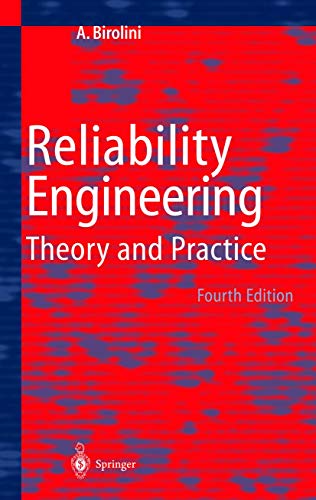Verwandte Artikel zu Reliability Engineering: Theory and Practice

Zu dieser ISBN ist aktuell kein Angebot verfügbar.
Alle Exemplare der Ausgabe mit dieser ISBN anzeigen:Book by Birolini Alessandro
Die Inhaltsangabe kann sich auf eine andere Ausgabe dieses Titels beziehen.
Críticas:
From the reviews of the fourth edition: Title: Reliability Engineering: Theory and Practice, Fourth Edition Author: Prof. Dr. Alessandro Birolini E-mail: birolini@emeritus.ethz.ch Publisher: Springer-Verlag, 2004 Reference: ISBN 3-540-40287-X Reviewer: Kenneth P. LaSala, Ph.D. KPL Systems Silver Spring, MD 20904-3323 Professor Birolini and Springer-Verlag recently have published the fourth edition of the excellent text entitled Reliability Engineering: Theory and Practice. The structure of the book remains basically unchanged from the previous editions: Chapter 1 addresses the basic concepts associated with quality and reliability assurance of complex equipment and systems. Chapters 2-8 focus on reliability, maintainability, and availability analysis and test, with Chapters 3,5, and 8 focusing on practical aspects. Chapter 2 covers reliability analysis during the design and development phase and covers system structures and redundancies. It also covers reliability allocation (a favorite subject of the reviewer), mechanical reliability, failure mode analysis, and design reviews. Chapter 3 discusses qualification tests for components and assemblies. Included topics that are extremely useful but a bit off the chapter theme are basic component selection criteria such as environment, performance, technology, manufacturing, and reliability. Chapter 4, Maintainability Analysis, has added models and considerations for spare parts provisioning. The chapter also addresses maintenance concepts, design reviews, and predicting maintainability. Chapter 5 addresses many of the non-statistical design considerations such as derating, cooling, electromagnetic compatibility, and testability. Significantly, this chapter now includes design guidelines for software quality that address defect prevention, configuration management, software testing, and software quality growth models. Chapter 6 addresses redundancies and now addresses complex repairable systems in a variety of ways, including imperfect switching, incomplete coverage, and Monte Carlo simulation for rare events. Chapter 7 discusses statistical quality control, reliability tests, maintainability tests, accelerated testing, and goodness-of-fit tests. Chapter 8 covers quality and reliability assurance during the production phase. It includes screening and growth testing, although neither screening nor growth testing (especially the latter) should be restricted to the production phase. Appendices A1-A5 address definition, standards, and program plans for the reliability assurance and management of complex systems. This is an important addition because it helps readers specify and achieve high reliability targets. Appendix A4 is particularly useful because it includes checklists for design reviews. Appendix A5 describes requirements for quality data reporting systems. Appendices A6-A8 address basic probability theory, stochastic processes, and statistics. Appendix A7 focuses on basic stochastic process theory and includes Markov, semi-Markov, and semi-regenerative processes. This appendix now includes new models that address non-homogeneous Poisson processes (NHPPs). Appendix A9 includes statistical tables, Laplace transforms and probability paper samples. All in all, Professor Birolini has given readers an excellent instructional tool and desktopreference. It is extremely well written. The span of topics makes the coverage of some topics necessarily brief. Professor Birolini presents much of the non-statistical information in a manner that could be understood easily by engineering and program managers as well as reliability experts. He discusses the statistical topics in the proper amount of detail to ensure at least a good basic understanding. Tables, illustrations, and examples amply support the text. However, one disadvantage for classroom use could be that there are no sets of problems to be worked for homework assignments. The reviewer thanks the author for the opportunity to review this excellent book and recommends this book highly. al/index.jsp?pageID=relsoc_home, and navigate to the IEEE picscaley "One of the key components of customer satisfaction (a pillar of the total quality management movement) is the reliability of a product. ??? This book is based on Birolini??'s 30 years experience in this field both in industry and academia. ??? All in all, the book of Professor Birolini can be highly recommended. It is ??? written as a text book for those versed in maths and working in the field of RE, and as reference book for others including project managers." (Kasturi Narasimhan, The TQM Magazine, Vol. 17 (2), 2005)
Reseña del editor:
This book shows how to build in, evaluate, and demonstrate reliability and availability of components, equipment, and systems. It presents the state-of-the-art in theory and practice, and is based on the author's 30 years experience, half in industry and half as professor of Reliability Engineering at the ETH, Zurich. In this extended edition, new models and considerations have been added for reliability data analysis and fault tolerant re-configurable repairable systems including reward and frequency / duration aspects. New design rules for imperfect switching, incomplete coverage, items with more than 2 states, and phased-mission systems, as well as a Monte Carlo approach useful for rare events are given. Trends in quality management are outlined. Methods and tools are given in a way that they can be tailored to cover different reliability requirement levels and be used to investigate safety as well. The book contains a large number of tables, figures, and examples to support the practical aspects.
„Über diesen Titel“ kann sich auf eine andere Ausgabe dieses Titels beziehen.
- VerlagSpringer-Verlag Berlin and Heidelberg GmbH & Co. K
- Erscheinungsdatum2003
- ISBN 10 354040287X
- ISBN 13 9783540402879
- EinbandTapa dura
- Auflage4
- Anzahl der Seiten559
(Keine Angebote verfügbar)
Buch Finden: Kaufgesuch aufgebenSie kennen Autor und Titel des Buches und finden es trotzdem nicht auf ZVAB? Dann geben Sie einen Suchauftrag auf und wir informieren Sie automatisch, sobald das Buch verfügbar ist!
Kaufgesuch aufgeben